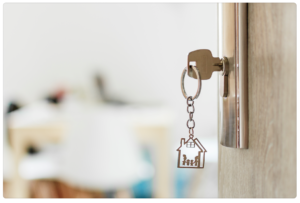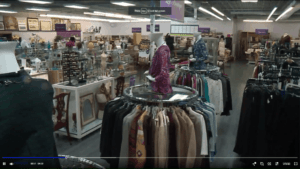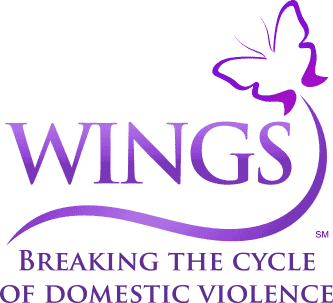WINGS Safe House Staff Discuss 4 Takeaways from the Netflix Show – Maid
- Posted by Sarah Swiston
- On April 19, 2022
- chicago metropolitan area, children survivors dv, Domestic Violence, domestic violence agency, DV agency, End Domestic Violence, family services, Housing Programs, Maid, Netflix, Safe House, Shelters, WINGS, WINGS Program
This fall on Netflix, Maid was frequently in the top ten viewed series. Based on a memoir of Stephanie Land, Maid: Hard Work, Low Pay, and a Mother’s Will to Survive, a mother and her young toddler daughter leave an abuser. Below are 4 Takeaways from the Netflix show, Maid, discussed by two of WINGS front-line domestic violence shelter workers.
Sharing their feedback is Iris B., WINGS Manager of Safe House Services, at the Suburban Safe House and Cha’Von H., WINGS Supervisor of House Advocates, at WINGS Metro Safe House.
Below are spoilers for the show, in case you would like to finish reading once you have watched the series.
1) Triggering First Episode
If you or someone you know has experienced domestic violence, the series and particularly the first episode, can be triggering. In the first episode, the protagonist, Alex, leaves in the middle of the night with her young daughter, Maddy.
Cha’Von shares, “I had to do something else while I was watching that first episode because it brought up a lot of strong emotions.”
Iris adds, “One of the first actions she takes is going to her friend’s and she quickly realizes they are more motivated to help her reconcile with her abuser. This is very common. Survivors may think their friends will be their support system, but the friends, and even family, may not understand or be supportive of the separation.”
“Yes, her mother also had her own mental health challenges while also being in her own cycle of financial abuse. It is not always a given that survivors will be able to get help from family members,” Cha’Von shares.
2) Navigating the Systems
Maid also highlights the challenges survivors must navigate to live free from their abuser. Some of these include navigating social service systems and the stigma that can accompany them.
Housing Challenges
“Early in the series, it seemed to me that domestic violence was secondary and homelessness was the primary issue. I felt like in the beginning, the domestic violence was downplayed a bit. It took Alex awhile to even identify as a domestic violence survivor. I think all shifted when her daughter was taken away and her back was against the wall. I thought they did a great job of showing the different systems survivors have to navigate to find stability,” Cha’Von shares.
Iris adds, “The show was very clear about all of the hoops the systems make people run through to receive services. I need to have a job before I can get childcare assistance, but how can I obtain a job without having childcare. All these hoops can be very discouraging, but this is the system and we try to help clients find solutions to get through them.”
 “Regarding the scenes where Alex is trying to get her housing voucher approved, we have seen that with our clients as well. We had a pregnant client, who also had two boys, wait to tell us she had an eviction on her record. She was ashamed or thought it would ruin her chances of getting housing. She kept having the door closed in her face and we didn’t understand why she couldn’t find an apartment. At the very last minute, she came to us desperate, but we weren’t going to make her leave the program with nowhere to go. She fought so hard, but would get so discouraged,” Cha’Von recalls.
“Regarding the scenes where Alex is trying to get her housing voucher approved, we have seen that with our clients as well. We had a pregnant client, who also had two boys, wait to tell us she had an eviction on her record. She was ashamed or thought it would ruin her chances of getting housing. She kept having the door closed in her face and we didn’t understand why she couldn’t find an apartment. At the very last minute, she came to us desperate, but we weren’t going to make her leave the program with nowhere to go. She fought so hard, but would get so discouraged,” Cha’Von recalls.
Court Systems
Unfortunately, the court scenes early in the series rang true.
![]() Cha’Von elaborates, “I thought Maid showed how overwhelming the whole court process typically is for survivors navigating it for the first time. Some people sit by themselves and don’t know the protocols. It is pretty sad that there is such a long waiting list for legal services. Some people want a divorce or custody right away or an Order of Protection. It is hard when they have no financial resources because the abuser is the bread winner…
Cha’Von elaborates, “I thought Maid showed how overwhelming the whole court process typically is for survivors navigating it for the first time. Some people sit by themselves and don’t know the protocols. It is pretty sad that there is such a long waiting list for legal services. Some people want a divorce or custody right away or an Order of Protection. It is hard when they have no financial resources because the abuser is the bread winner…
…We see abusers use a lot of scare tactics involving the court system. One client’s main goal was to be reunited with her son. She had left her abuser with nothing. She had no job history and only her passport from India. For her entire 89 day stay with us, she wasn’t allowed to see her son. However, she started from scratch. She worked at a local coffee shop. Her work ethic was so strong, she connected with her bosses and was promoted…However, because at the time of the trial she had suffered from financial abuse, in the eyes of the court, the abuser appears to be the more stable parent.”
3) Emotional Abuse is Abuse
“I watched the series with my mom. Before the series, she didn’t really understand what our work was like at the Safe House. After watching Maid, my mom now understands more about how mental health and emotional abuse are baked in to the cycle of violence,” Iris says.
Iris continues, “Maid showed how someone doesn’t have to have experienced physical violence to feel trapped in an abusive relationship. The part where Alex is laying on the couch and being sucked in was a phenomenal visual representation of how helpless survivors can feel about their situations.”
“I’ve seen that a lot, where people don’t think they were ‘good enough’ to deserve help or what they went through wasn’t abuse because it was ‘just verbal,’ but emotional abuse is damaging. No one deserves it,” Cha’Von says.
Cha’Von adds, “Alex’s family often talks down to her. She has a full schedule, yet people try to make her feel like she isn’t a good mom for not spending as much time with her daughter. We always make a point to tell people when we see them doing a wonderful job.”
4) Comparing the Shelter Experience
Having their own space
Iris shares, “In the show, Alex got what looked like her own apartment when she moved into the Safe House. While WINGS Safe Houses are clean and welcoming, we often have shared living spaces.”
 Cellphones
Cellphones
Cha’Von adds, “In the show, the Safe House took Alex’s phone and we do not do that. We will help people with privacy settings; however, the montage where Alex is making calls on the corner and other survivors start noticing her progress rings true for us. We do see clients motivated by other clients’ successes.”
Client Relationships with other Clients
Cha’Von says, “We also see clients motivated to help each other just like in the show. In Maid, Alex makes a friend who lets her know what to expect in court and is somebody to talk to that can relate. Someone to share feelings with who is walking in your shoes with you. We see families going places together: driving to grocery store, taking kids to school or to work, etc. When these relationships are built, people learn they don’t have to feel like they are alone.”
Unfortunately, survivors may return to their abuser, just like the show pointed out. “Just like in the show, we cannot give out the survivor’s contact information and it may not be safe to call them. On the show, the woman at the shelter touched on the fact that survivors will return to an abuser an average of seven times before leaving for good and we have to be ok with it and pray. It is a hard reality,” Cha’Von shares.
On-Site Clothing Store
 Cha’Von says, “I liked the clothing store they had on-site and how it reintegrates survivors into the world. We have a similar support with our WINGS Resale stores. We give clients gift cards to shop at their own leisure. I know clients appreciate the gift cards and anytime we know a family needs something in particular, our staff is good at keeping an eye out. We were able to get one mom all of her uniforms for her career training. It adds one less thing to be stressed about. We have had clients learn about a job interview with less than 24 hours to pull together clothing. To have that resource available is amazing. Families moving into housing can sometimes even get a couch that is seemingly brand new.”
Cha’Von says, “I liked the clothing store they had on-site and how it reintegrates survivors into the world. We have a similar support with our WINGS Resale stores. We give clients gift cards to shop at their own leisure. I know clients appreciate the gift cards and anytime we know a family needs something in particular, our staff is good at keeping an eye out. We were able to get one mom all of her uniforms for her career training. It adds one less thing to be stressed about. We have had clients learn about a job interview with less than 24 hours to pull together clothing. To have that resource available is amazing. Families moving into housing can sometimes even get a couch that is seemingly brand new.”
Takeaways
Overall, WINGS staff were very impressed that a Netflix show was bringing this topic to light. Staff found it engaging, accessible and truthful in its representation of why it can be so challenging for survivors to break out of the cycle, especially if abuse is intergenerational.
Cha’Von adds, “The main character in the show got her life together in under a year, which can definitely be on the low-end of time. Although it is possible, there will definitely be some bumps. She showed how hard and motivated she was to give her daughter a better, stable life and we see clients all the time motivated by their children.”
Help is Available
Maid also brought to light that there are agencies ready to help survivors of domestic violence. If you or someone you know needs assistance:
Domestic Violence 24-Hr Hotline: 847.221.5680
To learn more about Counseling and/or Mentoring, call WINGS Intake Line: (847) 519-7828
The Intake Line is answered by trained crisis workers Monday-Friday, 9am-5pm. If you should call outside of these hours, please leave a message and a worker will return your call the next business day.
Learn ways you can make a difference for Domestic Violence Survivors:



0 Comments